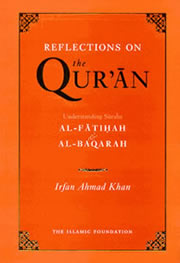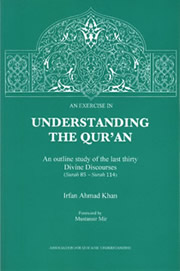1. FORGIVENESS is part of essential nature of a believer (mu`min) who is all the time looking for God’s forgiveness. It is so because one’s being saved depends upon one’s being forgiven. Therefore, most important consideration for a believer is that God, his/her Lord, forgives his sins. Now consider the case of a believer who does not feel like forgiving another servant of God who has offended him/her. And, suppose further, that this believer does so in spite of the fact that the offender has realized his/her mistake. The question arises, if another servant of God has developed a true repentance and is requesting this victim of his/her offence to forgive while this believer still insists upon not to forgiving, then how this victimized believer him/herself will pray for Divine Forgiveness of his/her own sins.
Obviously, if you want your own sins to be forgiven, then you should also not hesitate in forgiving someone who offended against you and is now very sincerely requesting forgiveness.
The above is, in fact, the Qur’anic argument in the following quote:
“………..so they should forgive and pardon. Do you not love that God forgives you. And God is All-Forgiving and Merciful….” (24:22)
In the perspective, there are some, otherwise pious believers, who are still showing some reluctance in forgiving some wrong-doers who have now developed a true repentance.
2. In fact, just as door of spiritual progress for a servant (`abd) of God opens with an `abd’s sincere repentance and his/her seeking forgiveness from his/her Lord, in the life of a divided community of believers things are set right – or what the Qur`an names islah, begins – through a reconciliation that follows people’s mutual forgiveness. In fact, such a reconciliation can open immense possibilities for moral and spiritual progress of a family, both on micro as well as macro level. The Surah Yusuf, the surah #12 of the Qur`an describes, very elaborately, the case of the divided family of the Children of Israel that was united through forgiveness.
Just consider the following passage (12:88-93) from the Qur`an:
“So when they entered unto him, they said, ‘Your Royal Highness, affliction has visited us and our people. We come with merchandise of scant worth. Fill up to us the measure, and be charitable to us; surely God recompenses the charitable.’ He said, ‘Are you aware of what you did with Joseph and his brother, when you were ignorant?’ They said, ‘Why, art thou indeed Joseph?’
‘I am Joseph,’ He said. ‘ This is my brother. God has indeed been gracious unto us. Whosoever fears God, and is patient – surely God leaves not to waste the wages of the good-doers.’ ‘By God’, they said, ‘God has indeed preferred thee above us, and certainly we have been sinful.’ He said, ‘No reproach this day shall be on you; may God forgive you; He is the Most Merciful of all those who are merciful.”
In the above story, Joseph is forgiving those who were, sometimes, plotting his murder. These are his brothers from the same father but different mother. In his boyhood, they had cast him into the bottom of an abandoned well, and then left him alone – far away from their village. Joseph is now a high rank minister, who is the right hand to the King of Egypt. His step brothers have come to him begging for food. They do not know that this princely governor, who has been showing great favor to them sice the famine broke, is really the same person whom they had thrown into the pit long ago.
Also briefly consider in the following, a later part of their story, when Joseph’s brothers come back to their father with their brother’s shirt.
“So, when the caravan set forth, their father said, ‘Surely, I perceive Joseph’s scent, unless you think me doting,’… And when the bearer of the good tidings came to him, and laid Joseph’s shirt on his father’s face, forthwith he saw once again… They said, ‘Our father, ask God’s forgiveness of our crimes for us; for certainly we have been sinful. He said, ‘Assuredly, I will ask my Lord to forgive you; He is the All-Forgiving, the All-Compassionate.’”
Joseph was a believer and a great prophet of God.
Over and above an excellent moral character and spiritual caliber, God had blessed him
with practical wisdom and administrative skills. He knew how to manipulate for the creation of a right moment that would facilitate the above repentance (tawbah) and reconciliation. However, we will not go into all these details. Here we want to focus on the attitudes of indulgence, pardon and forgiveness which the followers of the prophets and messengers of God inherit from their pious forefathers.
3. The Qur’an underlines two opposite attitudes, the one based upon knowledge and the other on ignorance. The ignorant person has an inclination to make a false show of his/her prestige and fails to act with restraint. Knowledgeable persons, mainly those who derive their inspiration from the Divine Book, have humility and self respect. They act with caution – with a sense of responsibility.
(25:63) When the ignorant people act fanatically towards the believers, these “servants of the Merciful God” turn away from them, saying “salam” (peace).
(25: 72)As a general rule the servants of Merciful God remain away from all kind of absurdities and would bypass a nonsense with dignity.
In Surah #48,” The Victory,’’ the opponents who have based their lives on ignorance show lot of zealotry. The believers respond peacefully, with dignity, restraint and discipline. God thereby blesses them with shechina (48:26) and promises to forgive their sins. And God declares; “You are victorious”. (48:1)
(28: 52-55)
The Qur’an specially appreciates the tolerance and decency of the believers who are joining from the people of the Book. They avoid every effort of the ignorant people to create a situation of conflict, saying ”Peace be upon you”. “We are responsible to God for our deeds and you are responsible for your deeds. (Then why to fight).” These people do not believe in debate and argument.
These people believe in replacing evil by good – through doing good in response to evil.
The Qur’an repeatedly underlines that the way to eliminate evil from human society is through replacing evil by good. One can say that an offence has been done against me so I have a right to do equal evil and you can not blame me as long as I do not transgress. But then how the ideal that evil is eliminated from the world
(41: 30-36)
The believers who have committed to be steadfast in the way of God – whose mission is spreading goodness – need a very high moral caliber! In counteracting with your social reality, you have to return something better in response. In no way, evil equals good. So you must return good for evil.
And, suppose, sometime Satan who is trying hard to divide human family, creating hatred among us, succeeds in instigating you and you lose your temper, then come back to God and seek God’s refuge.
(13: 19-26)
The Qur’anic Movement aims at rebuilding the broken human relations.
The Qur’an is reminding the people of their covenant with God. Humans must take care of their mutual duties that are part of this covenant.
And you have to do your duty even to those who failed to do their duty to you.
If the policy of replacing evil by goodness is not followed, how the world of broken human relations will be repaired.


